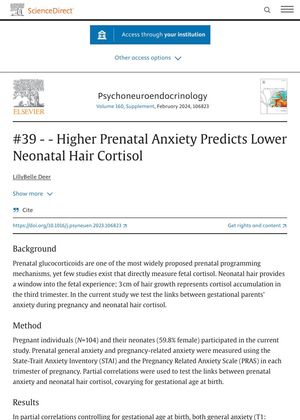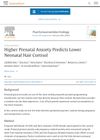Higher Prenatal Anxiety Predicts Lower Neonatal Hair Cortisol
February 2024
in “
Psychoneuroendocrinology
”

TLDR Higher prenatal anxiety is linked to lower cortisol levels in newborns' hair.
In a study involving 104 pregnant individuals and their neonates (59.8% female), researchers investigated the relationship between prenatal anxiety and neonatal hair cortisol levels. The State-Trait Anxiety Inventory (STAI) and the Pregnancy Related Anxiety Scale (PRAS) were used to measure general and pregnancy-related anxiety during each trimester. The study found that both general and pregnancy-specific anxiety were negatively correlated with neonatal hair cortisol levels when controlling for gestational age at birth, with significant correlations in the second trimester (general anxiety: r=-.228, p=.021; pregnancy-specific anxiety: r=-.229, p=.021). Lower neonatal hair cortisol, which reflects third-trimester fetal cortisol levels, has been associated with poor birth outcomes, cognitive function, and brain development. The findings suggest that higher prenatal anxiety could lead to lower fetal cortisol levels and potentially altered development.




